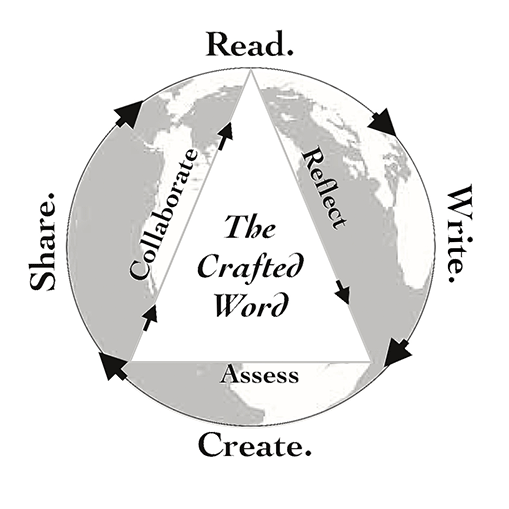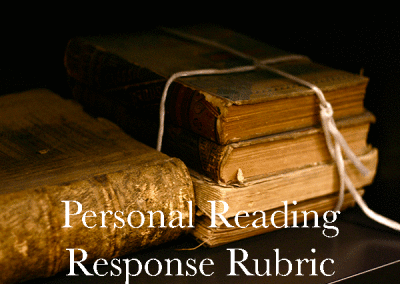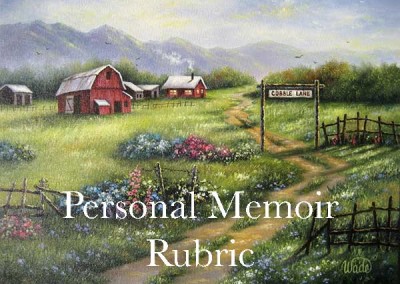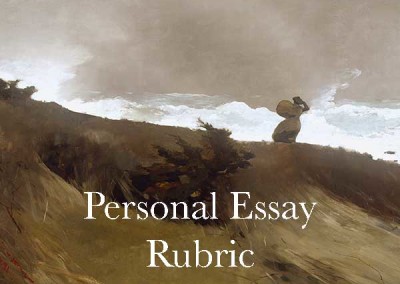
Teaching Traditional & Modern Skills for Reading, Writing, Creating & Sharing in a Digital World

Create a Better Classroom
for You & Your Students
Teaching Traditional & Modern Skills
for Reading, Writing, Creating & Sharing in a Digital World
Video Essays
Creating video essays out of traditionally constructed essays bring a whole new dynamic and range of possibilities for every student. A hard wrought and well-crafted essay is no longer a static piece of paper tucked away in a teacher’s desk or stashed in a crowded hallway locker. It is a multi-dimensional project that is shared with the world. Check out some of these that were created by my eighth and ninth grade classes.
It’s Over: A Final Reflection
~Paul, Eighth Grade
A Trip with Thoreau
~Charlie, 9th Grade
A New Way of Creating Rubrics
No longer will the term “rubric” create dread in your students. The Crafted Word Rubrics are not checklists; they are guides to help students respond to almost any assignment in a clear and confident way.
Try them out!
Few of us can do well if we don’t feel confident in what we are doing, but neither can that confidence be a misplaced confidence that is more succinctly called arrogance–a presumption of skill rather than an actual skill. Every time I create a teaching unit or plan a lesson–or even when I sit down to write something like this–I have to ask myself: “Do I really know what I am teaching, and am I teaching what I know in a way that all of my students are learning what I presume I am teaching?” I have to keep asking myself if I am the sage on the stage or the guide on the side; I have to keep asking if I am teaching essential skills and content or am I teaching what some reading workbook or English composition textbook says I should teach. Thankfully, at heart, I am still the shop teacher I have been for almost twenty years, but I am also the writer and teacher of writing I have been for more years than that.
Teaching shop is pretty cool because every kid comes into the shop with an untamed enthusiasm and eagerness to build something that is already in his or her head, and they are remarkably unfazed by their limited woodworking skills or by the scope of their dreams. I remember well an old student of mine who came into seventh-grade shop some years ago with detailed plans for building a one-man submersible submarine (as if you could build a non-submersible submarine:) and he begged me to give him a chance to try and build his design. Somehow he settled for something like a knapkin holder, but I heard the other day that he is now in Navy Seal training, so his ultimate dream never died; however, he learned that dreams can be realized and built out of a series of steps, an accumulation of skills forged out of the iron of real life and a dogged clinging to a vision of what he ultimately wanted to build.
Young writers (all writers) need that dream and vision, too. They need to love the possibilities that writing offers to build something as awesome and real as a six-board chest or a sparrow whittled out of a piece white pine. They need to go to the empty page with the same sense of possibility as the kid walking into the woodshop, and they need to want to learn the skills that will get them to a place they want to be as craftsmen and craftswomen of words and sentences and paragraphs and stories. Most importantly, they need a place and a way to learn and practice those skills: a workshop of their own to walk into and dream and learn and create.
Thoughts...
Thoughts…
The Woodshop as a Metaphor
- “Ah, the shop!” It smells good!
- They can move:
- They get to use cool tools
- They learn to “cut the board all the way through.”
- They need help–hence collaboration is natural and reciprocal.
- Their hands work as much as their heads.
- They own what they are building–and it has a purpose and a destiny.
- They get the teachers undivided attention–at least some of the time.
- The teacher leaves them alone–most of the time.
- Mistakes are fixed, not criticized.
- They “never” worry about their shop grade.
- They are surrounded by the future possibilities of shop class.
- They can see that building their toolbox is just a first step towards something like a boat, a chair, a bed, a table, a sculpture, etc: [We can do this in the classroom by having publishing parties, sharing digital portfolios, blogging—anything that allows students to see where their education is going.]
- There is a completion of a cycle: Though my students usually have smaller whittling projects going on the side, there is always one “big” project that takes them the entire term to complete, and it is always a source of pride.
- What you build stays with you for your life, if you wish.
How Is Your Classroom Experienced?
- A class is a physical place but also a metaphysical place:
- We can alter both the physical and the psychical to create a better classroom.
- What does your classroom look like?
- Is it yours? Or are you part of the shared classroom model?
- Does it reflect that part of you that you want to reflect.
- What does your classroom feel like?
- Where do you sit, stand, or move when teaching? (There really is not a right way if it keeps the students engaged, interested, and ready).
- Is there any cool factor?
- Is your class any different than the classroom next door? Should it be?
- What is the temperature of the emotional warmth?
- Only 30% can respond
- No talking allowed when leaving the room.
- The results of the problem are never published.
- Hmmm. How would it go?
Respond To the Primal Needs of Your Students
- They need you to be genuine: if you can’t then you shouldn’t teach.
- Notice them. As much for the good as the bad. Class Dojo maybe?
- Say hello when they show up for class. Students need affirmation that they are welcome in your classroom.
- Give feedback–verbal, visual, & written. They need affirmation that their efforts on your behalf will never go unnoticed and unappreciated.
- Show students you care about more than how they are doing in your class. This is where the power of blogging is unparalleled. In the shop, the very nature of the mentoring makes kids feel connected because the shop teacher really is helping “them.”
- Say goodbye when your students leave: make some sort of tradition surrounding the end of class. Your students last impression is a huge one, so make your goodbye a good and affirming ritual.
- Have special days, reward days, random acts of “let’s do something different days.
What Does an Engaged Student Look Like?
- What is Engagement and what does it took like?
- How do we create an engaging classroom?
- How do we nurture and sustain engaged students?
- How do we assess engagement?
- Create Rubrics, Folio’s, Videos, and blogging communities.
- You know it when you see it.
- An engaged student is willing and happy to figure it out.
- An engaged student feels like he or she has accomplished something worthwhile.
- An engaged student appreciates the value and or necessity of the content.
- An engaged student is alert, involved, and curious.
- An engaged student “can’t believe shop is over.”
- An engaged student will actually talk about what they did in class while driving home–and they might even bring it up on their own.
- An engaged feels like his or her time in your class is time well spent!
What Does a Disengaged Student Look Like?
-
- They can’t move.
- Everything is boring.
- The content and delivery is predictable.
- They can only use a pencil and paper.
- They work on their own—even when struggling with the basic concepts.
- Their heads are exhausted.
- Their bodies are exhausted.
- They’re hungry.
- They don’t know how to do what they are being asked to do.
- They only get help when they raise their hands.
- There is nothing palpable to show when class is done.
- They don’t know what they just learned?
- They don’t know how they did it?
- There is no endgame.
- The teacher hates them.
Limits, Rules, Expectations & Values
- Set Rules, Limits, Expectations with the same passion and resolve as you would with your family.
- Let them in!
- Set rules, standards & expectations.
- Create traditions.
- Do fun things together.
- Laugh a lot and tell stories.
- Point out right and wrong. The moral compass!
- Forgive and Move on.
- Treat everyone equally. Get rid of tracking unless absolutely essential! It is a caste system by any other name.
- Treat each student uniquely: know your kids, accept them for who they are. This is quite different than being a “friend” to your students.
Create Possibility
from wasting the labors of the people under the pretense of taking care of them.
~Thomas Jefferson
- There should always be a project going on.
- Projects should include collaborative and individual work.
- There should always be some sort of self-assessment.
- Students need to be able to claim genuine ownership, be free to pursue new directions and ideas, and exercise responsible and mature judgement when developing and creating that project.
- There needs to be an endgame of sorts–some way to showcase and curate that work for future generations to share.
The Power of Portfolios
- Collect. Collate. Curate: A new mantra for change!
- Our profession is only possible because of those who collected, collated and curated our bodies of literature, art, philosophy, history, and culture.
- Metacognition: It is important to remember, reflect and respond as a way of understanding who and how we are as learners (and teachers).
- Use journaling as a way to enable and practice metacognition.
- There are practical and affordable(as in free) ways to start doing this today!
- There is no downside. You are just being lazy if you don’t! (sorry)
The Perils, Pitfalls & Promises of Technology
- Are technology decisions being made for the right reasons?
- Are there a few people making the decisions for all of you?
- Do you want it that way?
- What is holding you back from using more–not less–technology?
- Does technology engage or simply distract?
- Does it simplify or complify (I need this word to exist)?
- Keep the focus on focus!
- Does technology make you grumpy?
- Do you, as a teacher, fully grasp the implications, limitations, and possibilities of technology?
- Is being engaged with and connected with a broader, diverse world important to a child’s education—to you?
- Managing classes and curriculum: Using an LMS such as Schoology, Edmodo, Haiku, Canvas, Moodle, Lore, etc., allows for easy access and sharing of assignments, grades, student and parent communication and a relative transparency of process.
- Allows parents to “see” children’s grades as they are posted: [See “What doesn’t work” ]
- Extending the classroom: online discussions, portfolio sharing, flipped classrooms…
- Increasing collaborative opportunities.
- Leveling the playing field.
- Rethinking pedagogy.
- Teaches how to manage a digital footprint
- That which attracts, distracts–and vice versa–that which distracts, attracts…
- Complicates the classroom experience: too many logons, computers don’t always work, not enough access at home, hard to find work.
- Allows parents to “see” children’s grades as they are posted.
- Introduces a world the kids may not be ready for emotionally
- The learning is too distant from the classroom: kids don’t bond with each other in the same way.
How To Help Teachers
Thought…
How do you help teachers who are struggling to engage their students? How do you help teachers let go and grow and love and cope and change?
Points…
- As a teacher, you are the root of the problem or the source of inspiration. [No one wants to admit that they are not able to do well what they’ve been hired to do, nor do schools, private schools in particular, like to air their dirty laundry, and so change is made behind closed doors; administrators give advice, make demands, and press the issue and the teachers being questioned are fearful of losing their jobs, bitter at being unfairly targeted, and often still unable to change.
- Metacognition: Encourage teachers to “self reflect.” Explore and possibly embrace initiatives such as The Folio Project. [It has to start with how can we best adapt, change, evolve–whatever–in ways that make us better, more engaging, more joyful, and more effective teachers.]
- What can schools do to help teachers be more engaged and engaging?
- Set high, yet realistic, standards that encourage and enable teachers to feel empowered and energized by their career choice.
- Let teachers make the best use of their time.
- Get rid of content driven faculty meetings and focus on process driven meetings that invite participation, reflection, and renewal—stuff that might possibly energize, enlighten and transform—not simply educate and inform.
- Do all meetings have to be synchronous?
- Do all meetings need to be mediated by the same few people with responses generated by the same few teachers?
- USE TECHNOLOGY WISELY: Use discussion threads and require teachers to respond within a given time frame.
- Post power points and/or presentations online with a comment thread instead of making teachers sit through them.
- Take steps to lessens the work and time that keeps teachers from the core expectations of their jobs. Many schools still operate under the assumption that our parents only hear from us once or twice a semester, and so schools place great value on formal communications: conferences; mid-term comments; end of semester letters, etc, all without any built in time to accomplish these tasks in the course of their school days.
- Meet less or meet more, but never meet just to touch base unless it is a truly mutual meeting.
- Consider allocating days to parent meetings (a lot of schools already do this).
- Have a comment writing and proofreading professional day. If you give teachers the time—even if they do not use that time when it is given.
- Use an LMS/CMS that is open, interactive, and dynamic and which gives teachers room to evolve in their teaching practices and maintain communication with students, advisors, and parents.
Reflections
Reflections…
Are You Ready?
Writing an essay for me is relatively simple. I choose what I want to write about, and I start writing. There is not a soul in the world who is expecting anything out of this essay—or even know it is being created, which will be great if it dies an early and ignominious death. I don’t have a teacher pushing me in any one direction–like I am pushing you. The writing prompt and the inspiration is already in me; but, though I try to write well, there are no real-life repercussions when I don’t write well. My audience for this (which is you—my upper school English class) is remarkably small and polite, and as much as I’d like to think that you are captivated by my writing, I know that in reality you are a “captive” to my writing, because, as my students, you are a prisoner in my classroom. You are somewhat doomed to read what I write, but your actual freedom to write is hobbled by a teacher who is intent on extracting (by what must sometimes feel like any means possible) what you know and think about a narrow range of literature–in this case, the first chapter of Walden: the essay called “Economy.” Throw into the mix your other classes and what do you get: a few more books, an era or two of some history; some idea of why leaves turn red; a handy way discerning volume from the breadth and width of a fruit–a smattering of Spanish words or Latin roots: a bookshelf from shop and an abstract oil painting for your wall. Don’t forget your soccer and football teams, the school play, band, and student life, and now your day is completely filled.
But is it full?
It is certainly filled with an exhausting range of activities designed and structured to educate, enlighten, inform, and inspire. Your teachers are a diverse mix of people who really do give a damn about you and who spend more time than you might ever imagine trying to create and perpetuate this living and breathing machine called school, but, as Thoreau writes, “we[teachers and students] labor under a mistake.” We fill the day, but we rarely fulfill the possibilities of each day, and we never will until we remove the blinders that keep us on the beaten path. Frightening as it sounds, the lunatics must run the asylum: students must be allowed to take the reins and become learners and explorers, while teachers and administrators must adapt or die. “New ways for the new; old ways for the old.” (HDT) The world really is a different place now. The “noosphere” or “omega point” predicted by Pierre Teilhard de Chardin almost a hundred years ago is becoming a reality. People can be–and are–connected in ways unimaginable to the visionaries and teachers who broke the backs of tradition to create the schools we have today. But times have changed. The desk is more a ball and chain of myopic restraint, while our opportunities for true learning–for all of us–have never been greater.
Something has to give. Society and its schools have become as much slaves to assessment as we are creators of destiny. Measuring someone by “the content of their character” seldom makes it onto report cards. Instead, we measure your progress and achievements with a reptilian calculation of the merits and deficiencies of your responses to specific inquiries and lessons we are convinced we have taught well. We critique what and how you write, but rarely consider why you write. Though we seem compassionate and practice empathy, we still erect a barrier that only a few of you can get over unscathed–and those are the celebrated few: the smart, hard-working, and diligent students who somehow manage to do it all. Everyone else plays catch me if you can, and so this paradigm is set in motion, and it becomes the foundation of almost every school and university in the world. The gifted student becomes a recognizable icon, sculpted, shaped, and polished by the whims of academia. As parents we stumble over each other trying to weave our child’s place on the honor roll or his or her SAT scores–or even the average score of the whole town in comparison to every other school in the district–into the most casual of conversations. On the flip side of this coin, these honors are hardly as respected by peers and classmates (perhaps because they sense the inherent fraud and advantage to the system) and past prowess as a student soon makes for unsavory and indelicate talk even just mere hours after graduation.
Maybe doing well in school is not such an impressive accomplishment. It is pretty cool that we have a black president raised by a single mom–and we use this as praise for what educational opportunities can do; but history is full of great individuals who rose from humble beginnings. It is a recurring theme of humanity itself. It is part and parcel of what Joseph Campbell has termed “The Heroic Cycle.” Schools do not create greatness; our primal need to be great is what creates greatness. No one reading this is precluded from realizing his or her individual greatness. We don’t have to be Telemachus facing up to the rowdy suitors in his house, but all of us have challenges that are unmet and untested, and we must meet them and we must test them if we want to be a hero. There is courage and strength of each of us, but not as much motivation, perhaps because the tools we use in school are not the best motivators. We instill as much fear as desire, and there is a subtle paralysis that takes hold. Only if the doors open wider and the walls fall down will we see the expanse of our opportunities–and only if you give enough of a damn to reach for the dream at hand, and then only if you see the dream. Realizing your dream should be your accomplishment, and layering dream upon dream should be your life.
Life has a way of doling out hardship in unequal proportions, but school should not be one of them. There is certainly very little that is fair about who goes to what school, but that is the unspoken inequity. We praise the notion of an egalitarian educational system, but we shudder at the thought of implementation. Few of my Concord friends would ship their sons and daughters to our schools in Maynard because…well, just because. Ironically, few of my Maynard friends would feel comfortable with their sons and daughters trying to mingle in a Concord milieu. And so we keep up a pleasant caste system that feeds off the tension between the rich and the poor. It’s like the old camp song: “Don’t chuck your muck in my backyard/my backyard’s full,” but because of the internet, our backyards have merged; the demarcation line is blurred, and there really is a chance for every kid to play on the same field–if we let them. Caesar accidentally burned down the Royal Library at Alexandria; we shouldn’t do the same with our new library of knowledge. During the first solo circumnavigation of the world, the Afrikaners in South Africa scoffed at Joshua Slocum’s claims that the world was round, even as he was ninety percent of the way around the globe! Wouldn’t it be ironic if our schools lost the race for knowledge because we dithered at the starting gate?
I certainly did not start this narrative with any plans to take on our educational system. Sharper minds than mine could tear this essay apart, but only because they have had so many generations to practice. The hurricane yesterday gave me a rare gift of time today, so I was just hoping to give you a few words to help you get started on your Walden essay. Words have that effect on me. Maybe my own rereading of Walden made me listen more closely to the drumbeat of my heart no matter how measured or far away; maybe in these political times of gloating, bitching, and belittling I didn’t want to be one of the thousand hacking at the branches of evil; I wanted to be the one striking at the root. The beauty and bane of Thoreau’s words is how easily they can prove either side of an argument, and my mind is so scattered that I could never get around to organizing all the facts; instead, I’ve simply scattered some seeds among the compost of my experience. Hopefully, one or two will be like the mustard seeds in that parable of Jesus. If not, I’ll have to till again and plant more thoughtfully.
All I know is what I sense: change is coming, and if you have your wits about you, you will be riding the edge of that wave.
Do You Really Want to Be a Teacher?
Let Kids Write
Few things in life are more important than having a passion for something. It is an offshoot of “give damn.” To have a life without a focus on some something or somethings to do and explore and develop on your own is a pretty pitiful life. When I was your age, I had a rock collection that filled a bazillion egg crates with chippings and scrapings I hammered off ; I had snake and reptile aquariums that had specimens of most any cold-blooded creature in the White Pond area of Concord. I had a shortwave radio that I made with my father–and a huge antenna on the roof to help pick up conversations happening anywhere in the world. I had a collection of fishing poles and rods and reels and lures and baits to somehow tease trout, bass, horned pout, kibbers, pickerel and anything else out of the Concord River, Walden Pond, the Assabet, Nashoba Brook and Warner’s Pond. Best of all my family had a plywood sailfish sailboat my father built in our garage from plans he got in somehow to magazine, and in that 12 feet of arc, I got my first taste of sailing–a taste that is as strong today as it was back then. My bedroom was a mess of magazine both strewn and piled–but always read: Boy’s Life, Popular Mechanics, Popular Science, Field and Stream, Sears Roebuck, National Geographics and any other magazine, book, or journal that fed my passions. Most of those publications are still around to buy in some way today, but there is an even larger world of bloggers out there who cover everything those magazines covered–and a whole lot more. These blogs and websites are where people go to feed their passions and develop their own knowledge and skills. It is where you go and where I go, and the better the blog or the better the site, the more often we return, and the more we return–the more of a mark that writer has left on the world. And that mark says something about that person. You. Something good, I hope.
In ancient Rome there was a saying: “De gustabus non disputantum,”otherwise known as “There is no accounting for taste,” which is a good thing because it keeps the world to this day interesting, diverse, and dynamic. We don’t have to like what other people like, nor are there any compelling reasons why we should–but we should like something; we should want to be knowledgeable about something, and be good at something, and to constantly be getting better at something. Think of your passions, and think of what you can do to live out that passion or passions and share it with the world. Think of what you are going to leave behind as your footprints in this life. You do not want to be like the drunk sailor Elpenor who fell off the roof and died a death that no one remembers or cares about. As Odysseus himself said: “No songs will be sung about him.” Your “digital footprint” is the song that is sung about you.
When I first started blogging with my classes–now close to ten years ago–most people were paranoid about kids names being “on the internet,” and so we built firewall on firewall behind private servers to keep you safe and removed from the real internet. In most ways it has been great. It gives you guys a safe place to practice living and sharing in the digital world without the dangers of anyone knowing you are out there. But times have changed. Soon you are going to want your name be out there–and out there in a good and positive way. You are not going to want someone to google your name and come up with…nothing. I am really proud to have discovered that it is relatively hard to study haiku and not come across my website at some point in your studies. I like that if someone googles my name they get the best of me and not the worst of me. I want that for you, too.
If you’ve got a passion, then keep learning and practicing and experimenting, and then share it with the world. If the seed dies with the flower, there is no beauty left behind.




Very interesting stuff. Actually, I am going to come back to this when I have more time and will comment again. Thanks!!